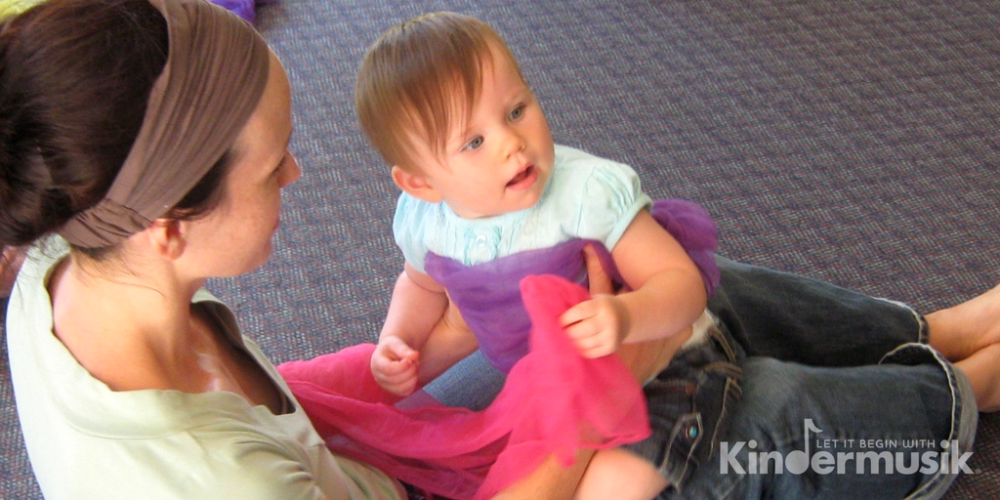You may wonder why we engage in regular intentional touch and relaxation activities during many of our Kindermusik classes? Of course there are many physiological and developmental benefits for our children when we engage in regular intentional touch activities such as massage (and I’ll get to those shortly), but have you noticed the benefits for you, the parent?
Back when my daughter was attending Kindermusik classes, I eagerly awaited ‘relaxation time’ each week as this was the only time my active and independent toddler would voluntarily crawl into my lap for a cuddle. I loved this time to just be with her, to feel her body snuggled against mine and to enjoy listening to the music and rocking together.
And now, as a Kindermusik Educator, relaxation time remains one of my favourite parts of our music classes. I love to see the toddlers, who were bouncing and bounding around the room just moments before, eagerly seek the embrace of a parent or carer. These shared moments are precious, providing adult and child with the opportunity to relax, unwind and re-connect.
The modern world is a busy one and we have such high expectations for ourselves and our children – sometimes it is easy to lose sight of what is important. When we engage in dedicated relaxation time we are giving ourselves permission to stop for a moment – to leave our daily stresses at the door – to take a deep breath and to focus fully on our children for those few precious minutes. It is a chance to be truly present for our children; to say, with a smile and a loving touch “Hello, I love you; I will take care of you” and for that emotion to be reciprocated.
Your actions communicate a very powerful message that helps build your little one’s emotional security and self-esteem. Emotional security is as important to your child’s development as eating and sleeping. With each cuddle, smile & giggle you are helping your child grow to be a confident, resilient learner.

“Touch is the first and most vital sensory experience. Research shows that our earliest experiences with touch can affect every aspect of our lives. Nurturing touch (or lack of it) can impact the way we think, feel and relate to others”*
Eye to eye and skin contact, and the exchange of soothing sounds, smells, cuddles and smiles all improve parent/child communication and bonding. In addition, massage also has many physiological and neurological benefits:
- Studies show that respiratory, muscular, circulatory and immune systems all benefit from the positive effects of massage
- Massage increases your baby’s ability to handle stimulation and promotes brain development
- Specific massage techniques can be used to improve digestion, relieve colic and tummy discomfort
- Massage relaxes, soothes and promotes deeper sleep*
We should never under-estimate the power of a loving touch and the message it conveys. In his book, “The Secret of Happy Children”, Steven Biddulph shares a story about a group of babies left orphaned in Europe at the end of the Second World War. Because there were so many babies in need of care (thousands), they could not all be accommodated at the American field hospitals and so some babies were taken to remote mountain villages and cared for by the locals.
Influenza and dysentery had taken hold in Europe and the death-rates were high. However, a Swiss health worker discovered that the death-rate for the babies being cared for in the hospitals (where babies were given the best of care – hygienic wards, stainless steel cots and regular milk formula feeds) was actually higher than for those that were sent to the villages where conditions weren’t necessarily as hygienic and babies were fed whatever was to hand – goats’ milk and offerings from the communal stew pot.
“He had discovered that babies need love to live. The infants in the field hospital had everything but affection and stimulation. The babies in the villages had more hugs, bounces and things to see than they knew what to do with and, given reasonable and basic care, were thriving”. **
So make sure that one-on-one time, whether it be massage, a snuggle as you read a book together, or just a cuddle and a chat before bed, becomes a weekly habit that your family can’t live without. And you don’t need to wait for your weekly Kindermusik class to give your little one their regular dose of love either – take a few moments now to give them a hug and sing them a special song – go on! Let them know with actions as well as words, just how much they mean to you.
written by Verna Hewitt, Music2Grow
* The International Association of Infant Massage (IAIM, 2001)
** The Secret of Happy Children, Steve Biddulph (1998) p.29

Having one just now, Verna! When my little (big little…he’s 20 months & 15kg!) guy’s feeling like he needs extra cuddles, I pop him on my back in our Mei Tai carrier & he’s as happy as can be 🙂 These days if he wants extra cuddles he goes & grabs it out of the cupboard & hands it to me.
Lovely 🙂
That’s just perfect Kathleen! Isn’t it great that he can let you know when he needs a cuddle? Thank you for sharing:)